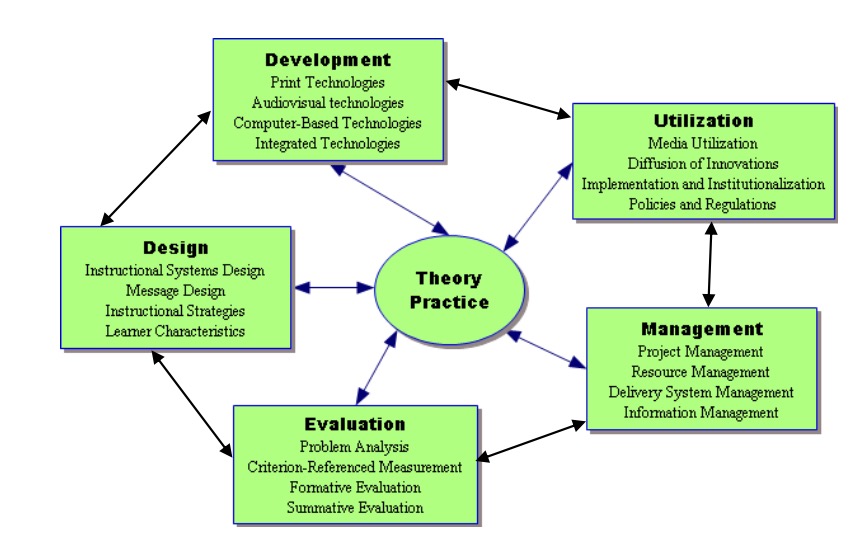Code and program: Students are also able to create their own technology thanks to the tools and skills taught in schools. In classes that teach coding, students are learning to program, build, and test their own robots, apps, and algorithms. Free resource of educational web tools, 21st century skills, tips and tutorials on how teachers and students integrate technology into education.
Educational Technology
Courses & Certification- Instructional Design Certificate (Fully Online). This fully online program is for anyone developing and/or teaching an online course. Learn more...
- ADDIE Instructional Design Certificate Program (Fully Online). This fully online program is designed for individuals interested in learning more about the ADDIE model. Learn more...
- Instructional Design Models Certificate (Fully Online). You will explore traditional instructional design models and the progression of the learning design approach to creating online learning experiences. Learn more...
What is educational technology? There are a variety of definitions of educational technology.
What is instructional design and technology?
The Association for Educational Communications and Technology (AECT):
Educational technology is the study and ethical practice of facilitating learning and improving performance by creating, using and managing appropriate technological processes and resources. [1]
The Encyclopedia of Educational Technology:
Educational technology is a systematic, iterative process for designing instruction or training used to improve performance. [6]
Educational Technology involves the disciplined application of knowledge for the purpose of improving learning, instruction and/or performance. [7]
History of the Definitions
Edtech’s [educational technology’s] definition has evolved over the years as a variation of ways of dealing with learning processes (2), a conceptual framework (9), theory and practice (5), and the latest study and ethical practices of dealing with technological processes and resources (1). [8]
1963
Audiovisual communications is the branch of educational theory and practice concerned with the design and use of messages which control the learning process. It undertakes: (a) the study of the unique and relative strengths and weaknesses of both pictorial and nonrepresentational messages which may be employed in the learning process for any reason; and (b) the structuring and systematizing of messages by men and instruments in an educational environment. These undertakings include planning, production, selection, management, and utilization of both components and entire instructional systems. Its practical goal is the efficient utilization of every method and medium of communication which can contribute to the development of the learners’ full potential. [2]
1972
Educational technology is a field involved in the facilitation of human learning through systematic identification, development, organization and utilization of a full-range of learning resources and through the management of these processes. [3]

Code Is Powerslcsd Educational Technology Resources Technology
1977
Educational technology is a complex, integrated process involving people, procedures, ideas, devices and organization for analyzing problems and devising, implementing, evaluating and managing solutions to those problems involved in all aspects of human learning. [4]
Code Is Powerslcsd Educational Technology Resources Inc
1994
Instructional technology is the theory and practice of design, development, utilization, management and evaluation of processes and resources for learning.[5]
References:
- Richey, R. C., Silber, K. H., & Ely, D. P. (2008). Reflections on the 2008 AECT Definitions of the Field. TechTrends, 52(1), 24-25.
- Ely, D.P. (1963). The changing role of the audiovisual process in education: A definition and a glossary of related terms. TCP Monograph No. 1. AV Communication Review, 11(1). Supplement No:6.
- Association for Educational Communications and Technology. (1972). The field of educational technology: a statement of definition. Audio-visual Instruction, 17(8), 36-43.
- Association for Educational Communications and Technology (1977). The definition of educational technology. Washington, D.C.: Association for Educational Communications and Technology.
- Seels, B. B., & Richey, R. C. (1994). Instructional technology: The definition and domains of the field. Washington, DC: Association for Educational Communications and Technology.
- The Encyclopedia of Educational Technology. What is Educational Technology? Retrieved from: http://www.etc.edu.cn/eet/eet/articles/edtech/index.htm
- Spector, J. M. (2015). Foundations of educational technology: Integrative approaches and interdisciplinary perspectives. Routledge.
- Hsu, Y. C., Hung, J. L., & Ching, Y. H. (2013). Trends of educational technology research: More than a decade of international research in six SSCI-indexed refereed journals. Educational Technology Research and Development, 61(4), 685-705.
- Davies, I. K., & Schwen, T. M. (1972). Toward a Definition of Instructional Development.
Educational technology
Educational technology, sometimes termed EdTech, is the area of technology that deals with facilitating e-learning, which is the learning and improving performance by creating, using and managing appropriate technological processes and resources. The term educational technology is often associated with, and encompasses, instructional theory and learning theory. While instructional technology is 'the theory and practice of design, development, utilization, management, and evaluation of processes and resources for learning,' according to the Association for Educational Communications and Technology Definitions and Terminology Committee, educational technology includes other systems used in the process of developing human capability. Educational technology includes, but is not limited to, software, hardware, as well as Internet applications, such as wikis and blogs, and activities. But there is still debate on what these terms mean.Technology in education is most simply and comfortably defined as an array of tools that might prove helpful in advancing student learning and may be measured in how and why individuals behave. Educational Technology relies on a broad definition of the word 'technology.' Technology can refer to material objects of use to humanity, such as machines or hardware, but it can also encompass broader themes, including systems, methods of organization, and techniques. Some modern tools include but are not limited to overhead projectors, laptop computers, instaeval devices and calculators. Newer tools such as smartphones and games are beginning to draw serious attention for their learning potential. Media psychology is the field of study that applies theories of human behavior to educational technology.
